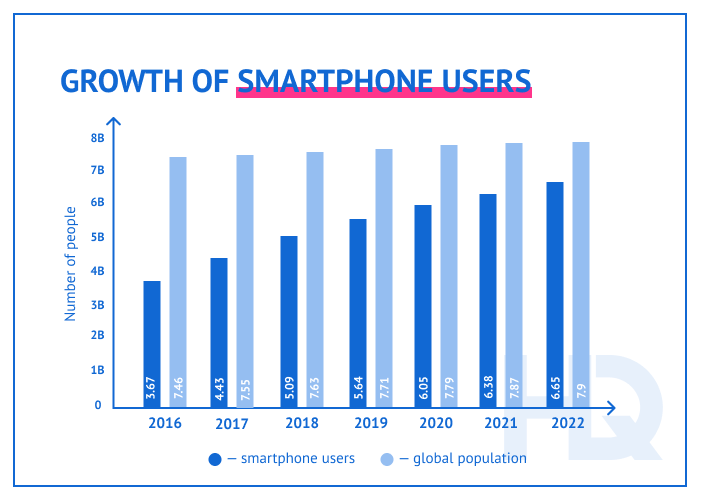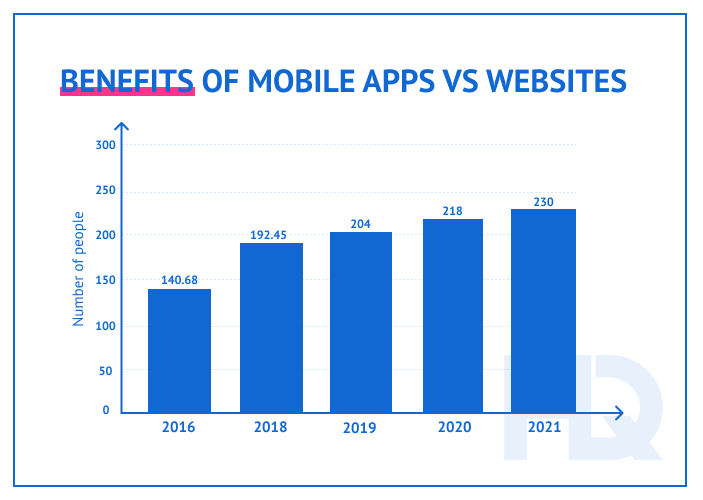Differences between mobile apps and websites
As of 2022, there are roughly 6.65 billion smartphone users around the globe, which is 86% of the global population.

No wonder businesses understand that having a mobile presence is a necessity to help your business grow, rather than a fad. The question is which to choose: mobile app vs. mobile website.
In this article, we will explore the benefits and downsides of the two options, to help you understand which variant suits you best.
What are the Differences Between an App and a Mobile Website?
What are mobile apps?
A mobile app is a program downloaded and installed on a user’s mobile device from a marketplace such as App Store and Google Play.
Mobile-adapted websites
A mobile website is a responsive website that consists of browser-based HTML pages linked together and adapted to mobile device formats.
Although both are used on the same devices, the difference between an app and a website lies in the access, purpose, and updating setups.
- Means of access. A mobile website is accessed via an internet browser. No download is needed, but an internet connection is required to gain access. A mobile app requires downloading from an online store, it is saved on a smartphone or tablet, and it may not require an internet connection to work.
- Purpose. A mobile app is great for frequent use, as it remains on the user’s smartphone. A mobile website is designed for communication with the purpose of informing a large audience about something, or for specific events and promotions.
- Updating setups. A mobile website updates online without the user realizing it. With mobile apps, users can choose whether they want to update them or not.
Benefits: mobile apps vs responsive websites
According to Statista, the number of mobile app downloads worldwide has been steadily increasing from 2016 onward, surpassing 230 billion in 2021.

Let’s take a look at the advantages of mobile apps over mobile websites for your business.
Device Capabilities
The first thing that comes to mind when we compare mobile apps vs mobile websites is the device capabilities that can be used by an application to enhance customer experience. Here are just a few of the possibilities:
- GPS,
- Phone dialing,
- Camera.
Brand promotion opportunities and brand presence
A mobile app can offer new branding opportunities to your customers. For example, your company can experiment with new branding tactics and styles. What’s more, your app stays on your customers’ devices even when they are not actively using it. The icon serves as a reminder and advertisement of the brand associated with the app.
Personalization
With mobile apps, it’s easy to offer users tailored communication based on their interests and usage behavior, as users can set up their preferences and customize apps to suit their needs. Mobile apps can also track user engagement and location and use them to offer custom recommendations and geography-specific content — for example, special promotions or deals at a particular store location.
Offline access
Probably the most fundamental advantage of mobile applications in the apps vs. mobile web usage battle is that mobile apps can run without an internet connection, so users can access information anytime and anywhere. Although mobile websites can use caching to load web pages without an internet connection, they can only offer limited functions.
Disadvantages of mobile apps
With all the advantages of mobile apps, there are some downsides that may influence your choice of web-based vs app-based solutions for your business.
High Cost
Mobile app development requires significant spending. According to Business of Apps, a simple app development price tag is from $16,000 to $32,000, whereas a simple, constructor-based website will cost up to $1000, and a basic responsive website is expected to cost between $10,000 and $20,000.
Compatibility
A properly functioning mobile application should meet the requirements of a particular operating system. Android and iOS will require separate app versions unless you develop a cross-platform solution. Compatibility requires expending time and money to make sure everything works the way it was intended.
Support and Maintenance
If you decide to develop an application for several different platforms, it will take time and money to support them — to provide updates and fix compatibility issues for every type of platform. Maintaining an application is another issue, as it requires approval from the markets where the app is placed.
Benefits of mobile websites
Today, 54.4% of all website traffic comes from mobile devices, so a responsive mobile website can be a good option for marketing and public communications. Take a look at the inherent advantages mobile websites have over apps.
Broader audience reach
A mobile app has to be searched and downloaded in either Google Play or Apple’s App Store. A mobile website, in turn, is accessible across platforms. It also can be easily shared and has greater reach capability through search engines.
Can’t decide between mobile apps and websites? Get a free consultation!HQSoftware has a team of skilled professionals ready to provide an individual estimation of your project and start developing righ away. Let’s talk!
Julia Tuskal
Head of Sales
at HQSoftware
Cost-effectiveness
Native applications are created for the users of a particular platform. Cross-platform applications have no limitations in access, but mobile app development cost and the time required double in this case. Also, such platforms are harder to maintain. A mobile website has much simpler access requirements — a browser and the internet on your device. That’s why it’s a more cost-effective solution.
Compatibility across devices
Users can reach your mobile website from different types of mobile devices, and there will be no major difference in the way it looks and works in browsers. Native apps require a separate version for each type of device.
Easier Updates
A mobile website allows you to update content and design much faster, as your changes are immediately visible once you refresh the pages. With an application, you need to plan updates in advance, which takes time. Also, there are users who don’t update their applications, so your new content or bug fixes may not reach your users at all.
Better findability due to SEO
Mobile website pages can be displayed in search results and listed in industry-specific directories, which makes it easy for qualified visitors to find your business. Applications, in comparison, are limited in their promotion possibilities.
Disadvantages of mobile websites
Although mobile websites have a wider reach, better compatibility, and require less money for development and maintenance than mobile applications, there are certain disadvantages.
Platform limitations
Mobile websites can’t fully use all the device capabilities. Android and iOS have different limitations and, sometimes, features can work on one platform and be unavailable on another.
For example, Android limitations include no access to the calendar, and restrictions regarding SMS and calls. Major limitations on iOS include no access to push notifications, Touch ID, Face ID, ARKit, and no integration with Siri.
Mobile websites can use some features of a mobile device like the GPS, camera, etc. However, there may be technological constraints in utilizing them.
User Experience
Mobile websites don’t allow UX experiments, as there are best practices you need to follow. This mostly relates to the single-window restriction, where a user shouldn’t have to leave their current page to access all the content they’re looking for. It requires good sense and UX knowledge to put the right amount of content in one window on a small display.
Offline Access
Mobile websites work offline with only limited functionality, using cached pages. In this mode, users can’t interact with any website elements, as this requires sending queries to the server.
Summary
The app vs website debate remains topical for businesses who want to establish a mobile presence. As you can see, both solutions have their advantages. However, if your goals are primarily marketing-driven, if you want to deliver content that will attract a wide audience and will be shared between users, go for a responsive mobile website.
On the other hand, if you aim to provide a superb user experience and need access to a user’s phone storage and native functions, a mobile app is the best choice.
Contact us if you need help to decide whether an app or a website will fit your business goals best.

Mobile Development Team Lead at HQSoftware
A highly skilled mobile developer with 12 years of experience and a passion to iOS apps. Has a deep understanding of user interface design best practices, possesses expertise in cross-platform mobile development.
Frequently Asked Questions
Mobile app or mobile website: which one should you use?
How much does it cost to develop a mobile app and mobile website?
Related Posts
View All
We are open to seeing your business needs and determining the best solution. Complete this form, and receive a free personalized proposal from your dedicated manager.

Sergei Vardomatski
Founder






